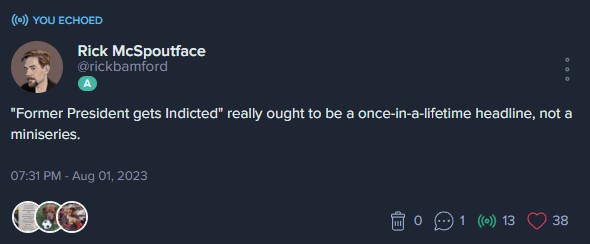I'm really tired of this, baseball edition

JP's expression says it all
Last night I attended the Mariners game with my good friends K & E, hoping for a nice pick-me-up for the team after their lousy road trip to Cincinnati and St. Petersburg. You can almost excuse dropping three of four to the Rays, they're a really good team. But now they were playing the Angels, who are, let's see, what is the technical term... oh, yes, they're bad.
Having fallen out of first place and clinging by a thread to a Wild Card position, the M's needed to come out strong. And so they did: a three-run first inning, and with Logan Gilbert on the mound, things were looking good. Until the Angels' catcher, promoted from the minors 2½ weeks ago, clubbed a home run to make it 3-1. OK, still not bad. His next time up, that same newbie hit a nearly-identical home run, this time with a runner aboard. Mariners 3, Logan O'Hoppe 3. Meanwhile, after that first-inning performance, the Seattle lineup could do nothing against the suddenly formidable Reid Detmers, who was 3-10 with a nearly 5.00 ERA. It was beginning to look like extra innings.
Then came an interesting ninth. The M's brought in their supposed closer, Andres Muñoz, who was somehow named AL reliever of the month for August. Seems to me whoever made that decision didn't see him pitch; I mean, a 1.4 WHIP isn't exactly stellar, but OK. Which isn't to knock Muñoz. I like Muñoz, but in my opinion he's not ready in the head for the pressure of the closer role. He's still pretty raw; someday he could be an elite reliever, but right now he's still learning on the job. E and I were talking about how Muñoz makes us nervous these days, and I mentioned that he's got great stuff but doesn't make good choices when he has a batter on the ropes.

A retro view of the game last night, as we sat in row 3 of section 337, one row forward of what had been my original Safeco Field season seats for several years. Though I'm happy in 327 row 9, I've missed you, 337! Especially the distance from the PA speakers there. Much less of an aural assault.
Mike Moustakas led off with a smart base hit against the limited defensive shift the M's were employing, just chopping a grounder toward third where nobody was playing. Not Muñoz's fault, his manager's, but OK. Then that O'Hoppe jerk is up again. Muñoz gets to a 1-2 count despite some poor home plate umping, but then tries to be cute. Does he buzz in that 100mph fastball above the letters? No, he throws the same pitch he just threw for strike two, which is nearly the same pitch he threw for ball one (it was in the strike zone, I could even see it from up high), and O'Hoppe said "thank you very much" and blasted it into left for a double. Next batter, Eduardo Escobar, gets in the hole at 0-and-2, but again Muñoz doesn't realize he's in charge. Escobar is a .230 hitter with a high K rate, at 0-2 he has to protect the plate. Muñoz can reach 102mph, but instead he throws the same slider he threw to O'Hoppe and Escobar hit it hard on a line, but the M's were lucky: it was hit right at Jarred Kelenic, who was shallow enough that the guy running for Moustakas at 3rd didn't try to tag up and score. Muñoz then hits the next guy with a fastball to load the bases. Now Brett Phillips and his .188 average is up. Could still get out of this if nothing goes wrong, and Muñoz has seemingly learned from his mistake and is pounding in 100mph+ fastballs. Phillips takes two quick strikes, then a third—except, no, called a ball. Next pitch also called a ball, but looked good from where we were. The next pitch was certainly strike three—except this umpire had dirt in his eye or something, because it's called ball three, and now the crowd is letting the ump have it. Phillips has gotten better timing on the fastball, but he's still fouling them off. Finally he swings and misses and there are two out. Next guy grounds out harmlessly to short and we're still tied. Whew.
Bottom half started out nicely. Cal Raleigh leads off with a base hit. Geno Suárez follows with another single. With Raleigh now at second base, manager Scott Servais smartly elects to replace him with a pinch-runner in José Caballero. Not the ideal choice, but the best one available. Ty France then lines a hit into left-center field and this looks like it! A walk-off victory! Except, what's this? Caballero is being held at third base??! Wait, didn't he just get put into the game for this exact scenario? Run, go for it, make them make a play at the plate. But no, Servais and third-base coach Manny Acta play it conservatively because, hey, there's nobody out and now the winning run is at third with no outs and that's easy to drive in, right?
Well, yes, unless you're the Seattle Mariners.
As I pointed out a while back, the M's suck at this. They only convert that runner at 3B with 0/1 out into a run scored about 40% of the time. Because they strike out. The team's overall 26% K rate actually gets worse with a runner at third and 0/1 out. Worse! Insanity.
To the surprise of no one in the stadium, Jarred Kelenic struck out. And the next guy up was Dylan Less-is-Moore, who despite playing above my expectations of late is still not a good Major League hitter and tapped a weak roller to the shortstop playing shallow, easy forceout at home. Now it was up to Dom Canzone, who just missed squaring up a pitch and rolled it to first. Extra innings. K & E both groaned in unison and I did a riff on the old Cars song "Moving in Stereo": M's are the same, we're groaning in stereo/M's are the same, they can't score from third...
I expected that to be that. The Angels would score their Manfred Man and the M's would not and it'd be over. And indeed, the Angels belted a homer to score two. Bottom 10 would surprise me when Julio Rodríguez crushed his own 2-run homer (his 30th of the season, congrats, Julio) to retie the game. Did we have hope? Not really. The Angels singled their Manfred Man to third in the 11th, then singled him home to go up 6-5, then Geno Suárez made an uncharacteristic error on a hard grounder that scored another run, then another hit and another run before Servais goes and gets Isaiah Campbell from the bullpen, who throws one pitch to end the frame and stop the bleeding. But the M's went down 1-2-3 in the home 11th.
Was this the game that effectively ends the Mariners' postseason hopes? We'll see; given the struggles the Astros and Rangers have both been having, and given that there are still a bunch of games to play against them, there's still a way to pull it out. But after this, my belief that the M's will never win a title so long as Scott Servais is their manager is solidified even more.

The "V"s were, perhaps, premature.
Bright spots

Gifts from the field
Though my climb back to stable orbit continues, it's been slow going and I've not gotten a lot accomplished of late. But there have been a few highlights that perked me up a bit:
- Mizuki went in to see the vet yesterday and was a champ. Scared out of her little kitten mind, but bravely got through being groped and stuck with needles and she's now had all her shots until next year. She was very popular with Dr. S and the whole staff at Cats Exclusive and I have to admit I liked it when she ran from the technician back to me when they were done with the shots. Don't worry, Tiny Moon, I've gotcha.
- I umpired a playoff series the other night, three games, and when one of the guys playing in the second game showed up early he saw I was the ump for the night and texted his teammates: "We got Tim tonight!!" It did me good, I wasn't feeling too well before heading to the park. That team won their semifinal but lost the championship game to a squad that also knows me by name now. The softball season is coming to a close soon, but meanwhile it's nice to be appreciated there.
- Relatedly, last week (or sometime? The days have all melded together lately) I umped another game with The Leftovers, who presented me with a team-branded beer cozy. I don't drink beer, but it functions as a Coke cozy just fine and I discovered they name-checked me on the thing:
That's pretty great. Many thanks to Neal and the rest of the team.
- Lower Decks is back! The new season got off to a pretty good start, not the best but still fun. I guess if you're a Voyager fan you'd appreciate it more, but that to me is the bad Trek. On the other hand, they made great fun of some of the goofiest/dumbest things about that series, so that's a plus. I see this LD ep as less of a "valentine" as a well-deserved mockery of some really terrible Star Trek.
Gaining altitude

Hello, world. Apologies to those who've left me messages or texts or whathaveyou over the past week or so. Between out of town visitors prior to the holiday weekend and an episode with my nemesis The Black Hole, I've been more or less incommunicado. Fortunately, this particular Black Hole experience has not been one of those full-blown depressive sucker-punches, rather one of the milder ones that remind me how much energy I expend to keep my normal stable orbit.
I don't know what, if anything, was the trigger event this time. Doesn't always have to be one. That's what makes it a relapsing/remitting clinical depression rather than a truly emotionally-based one. Well, one of the things, anyhow. So nothing "happened," though we did pass a couple of sad anniversaries that might tangentially connect—we passed what would have been my grandfather's 102nd birthday, shortly thereafter the anniversary of my mom dying. But really, I don't think those were key, I wasn't thinking about them much. It's just my fucked-up brain chemistry.
As I've said before about this, most of the time, thanks to good medicinal intervention, I do OK. My depression is tethered to me, visualized as a black hole with an unescapable gravity well, but usually I keep a good orbital distance. Maintaining it takes energy. And if I slip a little, it takes more energy to try and climb up again. And, sooner or later, it seems, whatever engine that powers that orbital thrust breaks down. Or overheats or something. My metaphor starts to collapse here, but I just get tired. The brain realizes how much effort its been putting into not-crashing and just needs a break.
Which means gravity pulls harder. Which means when I'm ready to come out of rest mode I have to work a whole lot harder to get back up to stable orbit. Which is tiring. You see how this can be endlessly frustrating.
Now, in this case—and again, I thank the makers of Sertraline for the generally effective assist—I didn't get pulled down all that far. I'd like to orbit at, say, moon level but I got pulled down to GPS level. Sucks, but way better than ISS level. Or atmospheric. I need these metaphors to help it make sense in my head.
Anyway, I've been tired. Sleeping a lot. Screwed up my already nocturnal tendencies to be downright vampiric. But it's better today, I can tell I'm gaining some altitude, and it's a good thing because I've got to be out in the world with the Daywalkers the next few days and then in a little over a week I have to take a quick trip to California, which I'm not really looking forward to but neither am I wishing wasn't happening. I'll take that, at this point.
Meanwhile, I have been keeping up with my and Erik's Substack about the Immaculate Grid. Because no matter what, there is always baseball.
1 CommentMaintenance issues

The comments problem appears to be fixed now. Apparently there were enough spam comments getting through that the server security put up a block. We'll see how it goes now; if spam gets bad again, I may have to institute some kind of member login procedure for commenting. Fingers crossed.
Meanwhile, in fixing that I ended up inadvertently resetting the URL for the RSS feed, so if you've subscribed to email notifications via Feedrabbit (the button up top there), you may need to do it again. If you get email notifications via zapier, I've adjusted it for you already. And if you actually use the feed in an RSS reader of some sort, hats off to you, I wish more people used such self-curated things rather than depend on social media links to navigate the web. But you'll also need to update the URL in your reader: https://starshiptim.com/home/rss. We thank you for your patronage.
No Comments yetGrid geeks
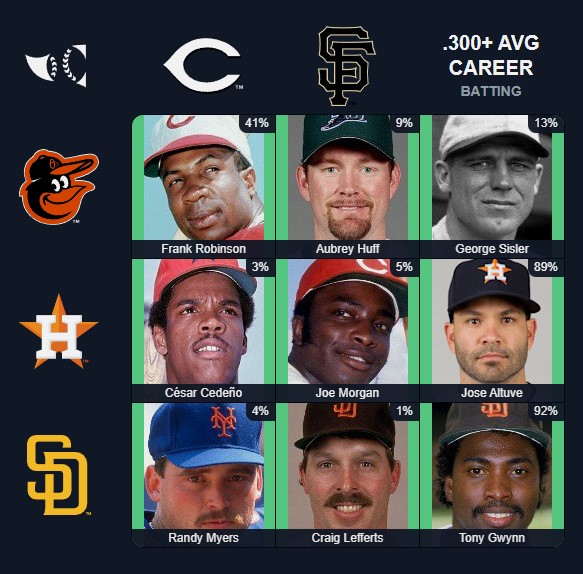
As I mentioned a while back, I've been doing the Immaculate Grid thing for a while now. So has Erik, and we were emailing each other almost every day about our Grid selections and such. Now we're bringing our ridiculous musings on obscure and world-famous baseball players to the masses! Just started today, we're at section327.substack.com. As Erik said in our introductory post, "If we’re going to waste this much time, we might as well waste it out in the world." Come see, and if so inclined, share your own Grid thoughts in comments.
I'm not that familiar with Substack as a platform, though I do follow a couple of substackers via email. I'm figuring it out as we go. I didn't know, for instance, that it has its own Twitter-like space (called "Notes"), which seems redundant to me. I'm on Spoutible now, I still have a Facebook account (mostly for promoting this, now that I'm no longer running the now-defunct grandsalami.net) though I rarely look at it, and that's plenty social media for me.
I do wish there was a bit more customization available there, but I suppose the whole point of Substack is to keep things simple and accessible. I can live with it.
No Comments yetComics POV
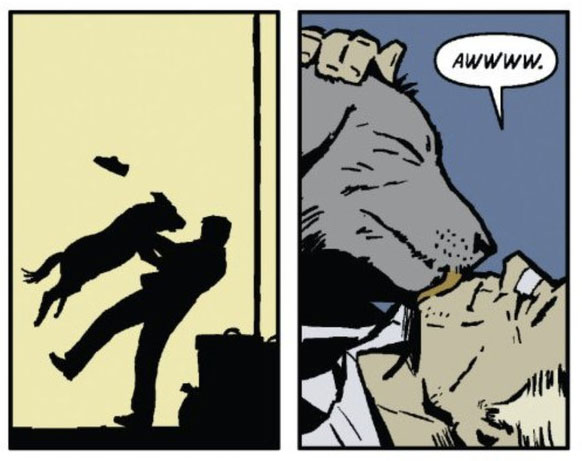
A superhero and his dog
Every once in a while, someone in the comics world will try something weird, a kind of experiment in format or style. John Byrne did an issue of Fantastic Four that was read sideways. DC had a run of a special Batman title that was in black and white to give it a more noir feel. Marvel had a month wherein their entire line was purely visual, no words.
A few months back—I'm a bit behind, I just read it yesterday—DC published an issue of Nightwing illustrated entirely from the title character's perspective. It took me a couple of pages to understand the gimmick, but once I did I thought it was cool. It was writer Tom Taylor and artist Bruno Redondo's take on the classic M*A*S*H episode "Point of View," which was shot as if through the eyes of a wounded soldier at the 4077th.
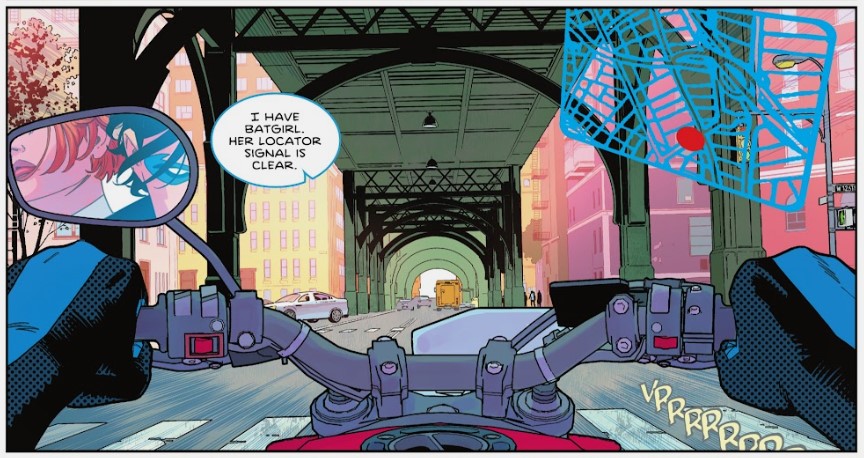
The heads-up display is fine, but Nightwing needs to adjust his side mirror, it's not doing him any good.
But more than the M*A*S*H episode, it brought to mind two issues of Hawkeye from about ten years ago. Writer Matt Fraction and artist David Aja delivered a run of that title that is among the best mainstream comics has ever produced, and issue #11 and #19 are standouts because of the perspective the story is told from. It was nice to be reminded of them and I'll have to find some time to dig those issues out and reread them.
Hawkeye #11 is entirely from the perspective of Hawkeye's dog, Lucky. Dialogue balloons mostly contain chicken-scratch with the occasional word Lucky recognizes—" \\||| \ \\ \|||| || sit \||| -\--||| bad ||\\\//\/\\||| lucky \\\|--///\|| down"—while the reader is shown how Lucky perceives the world through pictograms that translate the smells and sounds he's sensing, as well as how Lucky identifies various people by their associations with odors, events, and objects. The story follows Lucky as he discovers a resident of his building dead on the roof, then finds all the clues needed to find out who killed the guy. It's so, so good.
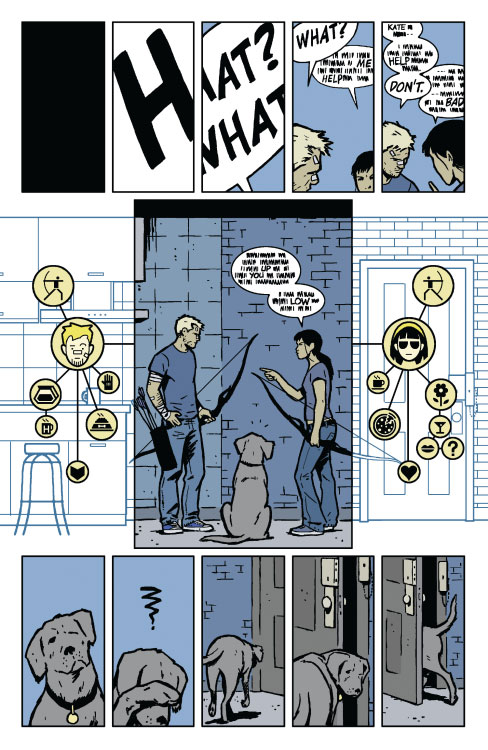
#19 focuses on the fact that Hawkeye had lost most of his hearing thanks to being caught up in an explosion in a previous issue and is told from his auditory perspective, which is to say, the word balloons are empty and he communicates via untranslated ASL. Just brilliantly done.
The Nightwing issue is a nice little gimmick. I appreciated it. It's well drawn and the story itself is fine, if not particularly memorable in and of itself. But what it really did was make me appreciate Fraction and Aja's Hawkeye all over again.
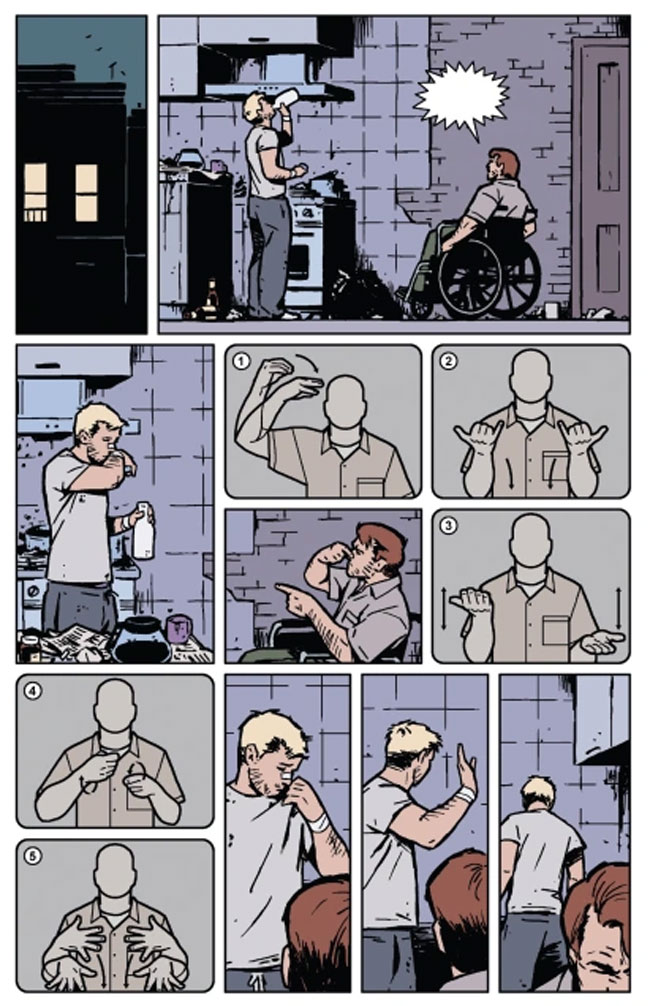
Historic imagery
I find myself wondering and imagining where and in what contexts this photograph will be displayed in years to come. History texts, to be sure. The Smithsonian, perhaps. Countless dartboards.
It's glorious. Due process, my dude. I know it's a new experience for you, but just think about how very, very long you've gotten away without having to endure it despite your life of crime.

More baseball
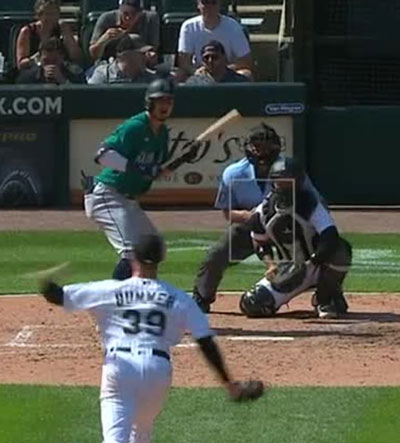
Josh Rojas uses his head and his skills against the White Sox
My last post recounted how my hometown Seattle Mariners had climbed the standings here in the second half of the season in spite of their strategically-challenged manager and an affinity for striking out at the plate—to the tune of ten times per game on average. They've played two games since—won one, lost one—and are even closer to the top of the heap in the American League West.
Yesterday they lost to the hapless Chicago White Sox in extra innings, with the winning run scoring in the form of the Manfred Man who ran home on a throwing error. The M's had come back in dramatic fashion with even more late-inning heroics to take a one-run lead in the 9th, then once more blew the save in the bottom half before giving up the ghost in the 10th. In isolation this would probably feel like a heartbreaking loss, but I found it to be the most encouraging game the Mariners have played in ages because for the second game in a row the team scored a runner from third base with 0 or 1 out in the inning.
Duh, you say. That's a gimme RBI, of course they did.
Except before yesterday they almost never did that.* The Mariners lead the Majors in being inept when it comes to scoring in that situation: they score the runner from third 42% of the time. They've also had the most such opportunities in the American League, second in the Majors only to the LA Dodgers, meaning they have that many more failures than any other club. The MLB average is, as one might expect, about 50%, with the Chicago Cubs leading the way at just over 57%, but with 18 fewer chances. A team can only get away with this level of ineptitude if they outscore the opposition by tons anyway and don't have a lot of close games (the Dodgers and Atlanta Braves don't have a great success rate at this, but they have run differentials of +149 and +214, so no big deal). The Mariners, though, have played a lot of close games. A third of their games thus far were decided by one run and they've lost 56% of those, and that doesn't count extra-inning losses by more than one run, something the zombie Manfred Man makes more common than it would otherwise be.
| Team | Overall Wins |
Run Dif |
Overall K% |
3B <2 out K% |
3B <2 out RBI% |
Wins in 1-run Gms |
| Seattle | 71 | +86 | 26% | 27% | 42% | 18/41 |
| Texas | 72 | +179 | 22% | 19% | 54% | 9/26 |
| Houston | 72 | +71 | 21% | 19% | 53% | 17/34 |
| Minnesota | 66 | +40 | 27% | 24% | 48% | 16/36 |
| Baltimore | 79 | +85 | 22% | 19% | 56% | 22/33 |
| Tampa Bay | 78 | +172 | 23% | 22% | 53% | 18/38 |
| LA Dodgers | 78 | +149 | 21% | 20% | 46% | 14/26 |
| Atlanta | 82 | +214 | 21% | 20% | 49% | 19/34 |
| Milwaukee | 70 | +10 | 24% | 18% | 49% | 26/37 |
| Philadelphia | 69 | +49 | 24% | 21% | 51% | 23/41 |
| Chicago Cubs | 67 | +67 | 23% | 20% | 57% | 17/32 |
| Arizona | 67 | -7 | 21% | 16% | 53% | 17/34 |
The M's strike out a ton in all situations, with an overall K rate of 26%, and it doesn't change much (it's actually a little worse) with runner at 3rd, 0/1 out. It's fairly consistent across the board. Which tells me that the team makes no adjustments for the circumstance, there is no directive to treat those easy RBI ABs any differently than any other ABs. Which is just dumb in a close game.
So if the season ends with the Mariners three, four, five games out of first place, it will be because they were unable to execute this incredibly basic baseball maneuver so very, very often.
Thus, they cannot afford to compound the matter by losing more games that way, which is why yesterday's loss was so encouraging. Their blundering manager didn't make any mistakes, his in-game moves were all fairly logical; the tying run in the 9th scored off of Andres Muñoz not because of a bad managerial move but a bad pitch location in a critical at-bat from Andrew Benintendi. Muñoz missed his target and Benintendi connected, just one of those things. Shikata ga nai. But the M's were in the position to have a 9th-inning lead because Josh Rojas laid down a fantastic bunt in the 7th inning with José Caballero on third base (and Caballero was on third because he had walked, stolen second, and stolen third; it was so my kind of run scored I couldn't have drawn it up any better). Even better, Rojas' bunt was so good he was easily safe at first, turning a would-be safety squeeze play into an RBI base hit.
That was fundamental baseball strategy that the Mariners seemingly never, ever employ. Maybe it was only possible because it was Josh Rojas, someone who came up in another club's organization and has only been with the M's for a few weeks, who might have actually had instruction in old-school things like bunting and squeeze plays. I don't know if he did that on his own, but I assume so since I can't picture manager Scott Servais ordering a squeeze play on purpose. I'd love to be wrong on that. But at least guys aren't prohibited from doing such things so evidence that at least the batters are thinking strategically is outstanding.
Was it a one-off? A unicorn in the world of a Scott Servais-managed team? God, I hope not.
Back at it tomorrow night at home vs. Kansas City, which is a fun team to watch despite their terrible pitching staff. Looking forward to it.
* Well, "never"; I mean, anything under 50% of the time is a problem, so "never" in the sense of "usually not."
No Comments yetBaseball notes redux

Julio Rodríguez was AL Player of the Week, having set a Major League record for hits within a four-game span with 17.
We're now into the final quarter of the baseball season, when things get tense and scoreboard-watching becomes a bigger part of the ballpark experience. Thus, posts here aboard StarshipTim will possibly get even more hardball heavy. I mean, this is the third straight baseball post. So, apologies if you prefer to read about politics or cats or TV or whatever. Maybe I'll try to mix it up a bit as we go through September.
Anyway, last time I posted here it was to rake the manager of Your Seattle Mariners, Scott Servais, over the coals for being a strategic moron. His decisions arguably lost three in a row for the M's and blew a lead in a fourth, losses that came in a critical point in the pennant chase as the team was starting to finally get their act together and deliver on the promise of preseason expectations. I stand by those criticisms as all three of those were eminently winnable games, but what's happened since then has been fantastic.
Maybe losing three (nearly four) winnable games in a row lit a fire under the whole lineup. The Mariners have won seven straight since then, scoring 55 runs in the process and climbing into a Wild Card position and within two games of the division lead. Had they won those three winnable games Scott Servais' dumbness may have lost them, their winning streak would now stand at 18 games. This team is hotter than the sun.
The season-long problems haven't really improved, though; the M's still can't score a runner from 3rd with 0 or 1 out, they still rack up strikeouts at the plate at an alarming rate and, relatedly, rely far too much on the home run. But they've simply been overcoming those deficiencies, delivering the two-out hit after failing to get the easy RBI or picking up a bad bullpen inning with shutdown successor relievers. Just like the Toronto Blue Jays of 1992-1993, a talented lineup can win even when its manager checks his brain at the clubhouse door.
| Tm | W | L | Pct | GB |
| TEX | 72 | 53 | .576 | — |
| HOU | 71 | 55 | .563 | 1½ |
| SEA | 70 | 55 | .560 | 2 |
| LAA | 61 | 64 | .488 | 11 |
| OAK | 35 | 90 | .280 | 37 |
| Tm | W | L | Pct | GB |
| TEX | 58 | 39 | .598 | — |
| HOU | 53 | 43 | .552 | 4½ |
| LAA | 49 | 48 | .505 | 9 |
| SEA | 47 | 48 | .495 | 10 |
| OAK | 27 | 71 | .276 | 31½ |
When the sun rose on Moon Day, July 20th, the Mariners were a game under .500, 5½ games out of a Wild Card slot and ten games behind division-leading Texas. From Moon Day forward, they've played 30 games and won 23 of them, a .767 winning percentage, and of the seven losses, six of them—SIX!—could have been won if not for striking out with runners at third base with 0/1 out and/or manager malfeasance with the bullpen. The seventh saw Seattle one run down in the bottom of the 9th with runners at second and third with one out, but guess what happened: strikeout. Just think how good this team would be if they weren't whiffing all the time and/or their manager knew how to handle relievers?
All seven of those losses are going to loom gigantically large when we get to late September and the American League West standings are tight at the top. Particularly since the Mariners close the regular season with ten games against the two clubs in front of them, the Rangers and Astros.
Regardless, though, it does make for a fun and exciting stretch run for the Northwest baseball fan. I'll start saving for playoff tickets.
Also, a while back my friend Dave turned me on to this thing called Immaculate Grid. It's a daily game wherein a nine-square grid requires a ballplayer from any point in the history of the Majors that meets the criteria given in both the row and column. It's a real challenge to the memory. Erik and I have had a semi-daily correspondence about it, comparing our respective successes and failures and musing on why we chose this guy for the Angels/Pirates square or why we remembered that guy at all, let alone for the Reds/Marlins square. And, of course, how dumb we felt by not remembering so-and-so, who should have been bloody obvious because hey, remember who he was traded for and how he was on that playoff team?
The goal with the Grid is to get the lowest "rarity score" you can, which is to say, pick the players least likely to be picked by others that still fit the criteria. My best score thus far is somewhere in the 20s; it's in my wheelhouse when there's a Cardinals row and/or a Mariners column and/or something like a stolen base total or a Hall of Fame stat. It's interesting in part because you access things in your memory from different points in your life. As Erik said (paraphrasing), things you learn when you're 14 are there forever; things you learn at 41 are buried under tons of detritus.
One day there was a Giants/Twins square and immediately the name Dan Gladden sprung to mind. Not sure why, but I think it has to do with a computer baseball game I had as a teenager that malfunctioned one time and had Gladden batting in every position for a Giants team. I recall the screen. I used Don Slaught a couple of times because I remember getting his baseball card. The ones I really like come up when I can use my knowledge of the various trades the Mariners have made over the years—Mariners and Twins? Why, Dave Hollins, of course, the guy the M's got in return for David Ortiz! What a great deal that was (ugh)—or my deeply ingrained memories of all things 1980s Cardinals—who played for the Cardinals and the Braves? How about Bob Horner, one of the worst free-agent signings the Cards ever made, to replace Jack Clark at first base after the pennant-winning ’87 season.
It's a hoot. Even when I feel incredibly stupid when I come up with nothing for Cleveland/Texas and then remember Shin-soo Choo, Milton Bradley, Julio Franco, Toby Harrah, Cliff Lee, and Omar fucking Vizquel only after I've gotten it wrong with a guess based on nothing more than "well, this guy played for a ton of teams, let's try him. Nope, oops."

Best score yet (21.3), thanks in part to a pair of truly awful trades made by former Mariners GM Woody Woodward (Hampton and Felder to the Astros for Eric Anthony; Spoljaric and Timlin from the Blue Jays for José Cruz Jr).
Bullpen follies
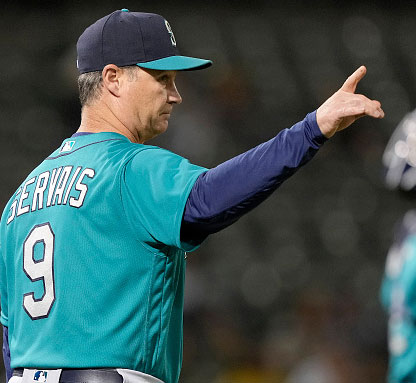
Scott Servais making the move for the wrong reliever feels like the rule, not the exception
When I first became enamored with baseball, in the late 1970s, I gravitated toward the part of the game that relied on speed, defense, and strategy. Likely this is because the first game I remember seeing on television was a St. Louis Cardinals game (probably on ABC's Monday Night Baseball, for you olds who remember) featuring Lou Brock, who was on split screen every time he reached first as everyone anticipated him stealing second. Which he did, because, hey, Lou Brock. Also, in those days the Kansas City Royals were always playing the Yankees in the playoffs, and the Royals played like that too (awesome), and then, hey, the Royals' manager, Whitey Herzog, moved across the state and started managing (and General Managing) the Cardinals, and I was hooked forever on Whiteyball.
Thus, the Herzog Way is my standard for baseball managers. I can appreciate other styles—though the Earl Weaver Way is antithetical to that standard and I won't abide that—but every decent manager I can think of (even old Earl) used his brain. The wheels turned in his mind as the game unfolded.
Then there are/were managers who did nothing, or did worse than nothing, because they weren't using their heads. I speak of those like Cito Gaston—indelible memory of Gaston comes from the 1992 World Series TV graphic denoting "Jimmy Key: First MLB at-bat" because Cito had never heard of a double-switch—and, sadly, Scott Servais, current skipper of Your Seattle Mariners.
As I've said before, Servais must be brilliant at off-the-field stuff. I mean, he has to be, otherwise how could he keep a job? During the game he's an idiot.
When I ran that other website about the Mariners for several years, I wrote several headlines like "Scott Servais and Dodgers defeat Mariners," or, because it seemed notable when no bonehead moves were made, "Servais Does Nothing Wrong in Loss to Astros." If I were still running that site, the theme would be getting pretty old as I would be chastising the guy day in and day out, at least lately.
Whitey is known for using steals and hit-and-run tactics and contact-hitting and frequent double-switching in the lineup, but what's sometimes overlooked is how good he was at handling a pitching staff. He knew each pitcher's strengths and weaknesses, could tell if someone didn't have his good stuff, and could adapt if something went awry because he knew not only statistical details but could read a guy's body language or quiz his catcher on how well pitches were hitting targets. Ken Dayley was Whitey's go-to lefty out of the bullpen in the late innings for a while, but if Dayley wasn't on his game, right away Ricky Horton would get up and throwing behind him (or Jeff Lahti or Bill Campbell if a righty was coming up). Danny Cox was a solid mid-rotation starter that could rack up innings, but if he started to lose his feel for the fastball he was out of the game. On the other hand, Joaquin Andujar might get a little more slack since he was fiery and emotional ("one tough Dominican," as he called himself) and might only be losing his cool momentarily and would be back to normal the next inning.
Scott Servais does not adapt. He chooses his go-to relievers based on some would-be logic that befuddles all (I remain convinced that some of the team's personnel moves over the last four years or so were made in order to remove certain pitchers from Servais' menu of options since he kept using them poorly). He leaves some starters in too long, hooks others too early. The situation on the field rarely appears to play into his thinking. Except when it comes to pitch count, he's often all about that regardless of other factors. He is the Un-Whitey.
Over the last four games, the M's have:
- Lost 1-0 in 10 innings, having early on failed once again to score a runner form 3rd with 0/1 out because of strikeouts, an ignominious category of ineptitude that the Mariners lead the Majors in; then after surrendering the zombie Manfred Man run in the top of the 10th, failed to advance their own, quite speedy, Manfred Man in the bottom half in favor of trying to hit a two-run homer and struck out three times to end it.
- Tied going into the 10th, Servais calls on Trent Thornton, against whom lefties had batted .429 and righties .100, to face three left-hand batters, two of whom connect for extra-base hits to score two runs including the Manfred Man for the loss.
- Wasted a fantastic comeback after being no-hit for 62⁄3 frames and rallying to take the lead in the 9th by going to Matt Brash to close it out despite Brash having terrible lefty-righty splits and a penchant for wildness while other, better options (Topa, who had faced just 3 batters in the 8th, Speier) remained. Brash serves up consecutive base hits and a hard line-drive sac fly to blow the lead; with runner at 3B and 1 out, does not walk the pinch-hitter that everyone except Servais expects to bunt; bunt laid down, run scores, game over.
- Brings in Andres Muñoz, who was wild and blew the save two days before, in the 8th inning to hold an 8-5 lead, then leaves him in to pitch the 9th despite clearly not having his good stuff—both velocity and control of both pitches lacking. Muñoz walks two and serves up two hits to lose the lead, and not until the sixth batter of the inning does Servais get anyone throwing behind Muñoz in the ’pen. M's would win it in the 10th thanks to a great defensive play by Dom Canzone that ended the KC 9th before a fourth run could score. (Also: first time I've ever seen a manager argue for interference on a play that ALREADY WENT HIS WAY. What are you doing, dude?!!)
In isolation, not a big deal. Shit happens. But this is a constant, almost everyday issue for the Mariners and has been for years. Mismanagement of the bullpen. Failure to deviate from your pregame plans and adapt to circumstance. Failure to recognize when a pitcher is in trouble and when he isn't. Failure to know who has success against what type of hitters. Failure to teach contact when you've got an easy RBI at third base, and relatedly, tolerance for enormous strikeout totals from batters.
It makes me think the M's will never win a pennant so long as Servais is the manager, but then I remember: Cito Gaston won two and he didn't even know what a bench was for.
So, you know, still a chance.
No Comments yetBaseball notes

Prior to last year, when I chose to abandon it mid-season, I was running a website all about Your Seattle Mariners baseball club. If it was still up and running, this would have been a full couple of weeks of posting there thanks to the annual Major League Baseball trade "season" that came to a close on August 1st. A lot of movement there to cover.
For better or worse—mostly better, as the work-to-benefit ratio at that site was pretty sad—I didn't pay as close attention to such things this year since I didn't feel a need to cover it online, but I have been involved in conversations as well as observed other comments regarding the trades made and not made by the Mariners.
Since July 1st, the M's traded away outfielder A.J. Pollock, pitchers Chris Flexen and Trevor Gott, and five minor leaguers of little impact (the most highly regarded of which is OF Jack Larsen, traded to San Francisco for a Player to be Named Later or other compensation to be determined); no one, including me, seems to think those deals are particularly notable. Pollock was a bust on a one-year contract, Flexen had pitched himself out of a job, Gott was expendable to get Flexen's contract off the books, and no real depth was lost from the minors.
They also released second baseman Kolten Wong and traded reliever Paul Sewald to Arizona. Those are the ones people talk about.
Wong was a disappointment with the M's after coming over in an offseason trade with Milwaukee, but to be fair, he was only given one chance, right at the beginning of the year. He started out slow, hit his high-water mark on May 10th (.195, .287 OBP), and then was given an average of 1.7 PAs per game the rest of the way. He might have fought his way out of the slump, he might not have. We'll never know. He hasn't caught on with another team yet, but I'm sure he will before long, and I'd bet he bats better than .250 with that new club. Still, his departure doesn't hurt the Mariners at all.
The Sewald trade is the one people question. Some think it was throwing in the towel on making the ’23 postseason. I disagree, I think it was a great move, selling high on a player who'll never be more in demand and improving the team long- and short-term.
The return for the M's in these deals was two minor-league pitchers of little consequence, a big-league reliever in Trent Thornton, two PTBNL or cash, and the three guys from the Sewald deal with the Diamondbacks: IF Josh Rojas, OF Dominic Canzone, and Triple-A 2B Ryan Bliss.
Rojas is no help. He basically replaces Wong with worse defense. He's versatile, can play four or five positions adequately, but the M's already have a better player like that in Sam Haggerty, currently toiling in Triple-A with a .321/.406/.580 slash line that makes me shake my head—why is he still down there while the M's keep trotting out Dylan Moore and Rojas? Even José Caballero hasn't been that productive, batting just .188/.275/.250 with a near-30% K rate since the middle of June. I'd much rather have Haggs on the roster than any of those three.
Anyway, though Rojas is meh at best, Canzone and Bliss are good players that just need a chance to prove themselves, and they play positions of need for the Mariners. The Seattle outfield is a mess, with last year's Rookie of the Year Julio Rodríguez the only solid everyday guy in the mix. Teoscar Hernández has been disappointing—though he's shown signs of being his old self of late (batting .302 over his last 10 games)—and Jarred Kelenic got mad and broke his foot while having a tantrum after striking out a while back. Canzone had a traditional development period in the minors, not skipping levels like the Mariners tend to do, and tore it up in Triple-A the last couple of seasons (.939 OPS in 588 ABs) before his recent callup and just needs an adjustment period to find his way in the bigs. Bliss needs a full year at Triple-A to gauge his readiness; he mashed at Double-A, which is promising, but skipping Triple-A is usually a bad move. Still, there's upside to the guy and he should either be a 2B candidate in ’25 or mid-’24 or a good trade chip.
More to the point, relievers in general and closers in particular are, in my view, tremendously overvalued. The number of truly dominant, sustainably effective closers in baseball since the save became a thing is small. There have been maybe a dozen. Half that if you're really strict in your metrics. Every team would like to have Mariano Rivera or Dennis Eckersley at the back end of the ’pen, but plenty of very good teams get by with the sort of effective late-inning relief that lasts for a year or two and/or that is found on some other club's scrap heap. Lots of guys can rack up saves. You know who's 21st on the all-time saves list? José Mesa. Yes, that José Mesa. There are 17 guys that have had 50+ saves in a season and I bet you can't name them all.
The list of relievers the Mariners have used as closers—effectively!—includes names like David Aardsma, J.J. Putz, Brandon League, Tom Wilhelmsen, Steve Cishek, and Mike Schooler. Even Bobby Ayala was decent at it in 1994. Paul Sewald is not out of place on that list, guys that were good for a while then flamed out or just had a couple of fine years in otherwise average careers. Point being, closers are easily replaced and Canzone/Bliss/Rojas is a more than solid return for a name from that list in general and Canzone is more important to the team right now by himself than was Sewald.
Sewald himself was a scrap-heap find. Picked up off the Mets' discard pile, he'd been a middling to poor relief option in New York, 14 losses and a 5.50 ERA over 147 innings. In his first opportunity with the Diamondbacks, Sewald blew the save while surrendering a pair of homers. The Mariners will plug someone else into the role—likely Andres Muñoz, who fits the classic closer "profile"—two-pitch type with fastball near or at 100mph and a favored breaking pitch—a lot more than Sewald did, but scrap-heap pickups like Justin Topa or Thornton might do just as well.
Seattle is now eight games above .500 and a better bet to make the playoffs now than they were a week ago. Good job.
Elsewhere in the baseball world, I happened on a section of baseball-reference.com that attempts to track the effects of Commissioner Rob Manfred's rule changes that went into effect this year. To my great non-surprise, so far the results are not such that it makes me change my opinion on them—on the whole, I still think they do more harm than good.
The pitch clock has shortened the overall time of games. To date in 2023, the average time of game is two hours and thirty-eight minutes. To my mind that's an overcorrection—2:45-2:50 seems about right for an average to me, and that was the norm from 1998, when MLB expanded to its current 30 team structure, through about 2011. From 2012 through last year it hovered around the three-hour mark. So Manfred has cut 22 minutes or so from the typical game, the most significant effect of his changes, mostly by reducing the time between the start of one plate appearance and the start of the next by 15-20 seconds. (The most striking number might appear to be the percentage of games over 3.5 hours—a minuscule 0.3% this year—but some of that is because of the inane, detestable zombie-runner-in-extra-innings rule that should be excised from the game immediately if not sooner, along with the at-least-equally detestable designated hitter rule. The zombie runners were a thing in 2020-2022 also, and there were a lot of 3:30-plus games in those years, so one could infer the pitch clock to be the primary factor, but I'd need to see data on the number of extra-inning games in each year.) I submit that this can be tweaked to make the change less severe by making the pitch clock a standard 20 seconds, not 20 seconds with runners on and 15 without.
The larger bases and the restriction on pitchers keeping runners close to the base has resulted in an uptick in stolen base attempts to roughly 0.9 attempts per game, or about what it was in 2012. The big difference is in the success rate: 80%, or about 10% higher than used to be the norm when attempts were that frequent. (Even my favorite team of all time, the 1985 Cardinals, which has that honor in part because they stole tons of bases, had a then-elite success rate of 77%.) This I attribute to the bigger bases and I feel like it cheapens the play. (Although, it may also be attributable to the newish more-common practice of catchers resting on one knee; the traditional catcher crouch is faster when it comes to getting a throw off to second base.) I love me a stolen base, don't get me wrong, but it loses something when it's not just the speedy guys that can get them.
The change that netted almost zero change is the ban on defensive shifts. Maybe a few individual players have benefitted form this, but overall it's been a big nothing:
| Yr | Gms | BA | BAbip | H/9 | 1B/9 | HR/9 | K/9 | R/9 | Ground Ball BA | LHB Ground Ball BA | RHB Ground Ball BA | Line Drive BA | LHB Line Drive BA | RHB Line Drive BA |
|---|---|---|---|---|---|---|---|---|---|---|---|---|---|---|
| 2023 | 3364 | .248 | .297 | 8.52 | 5.44 | 1.21 | 8.73 | 4.66 | .248 | .240 | .253 | .642 | .648 | .638 |
| 2022 | 4860 | .243 | .290 | 8.29 | 5.41 | 1.09 | 8.53 | 4.35 | .241 | .226 | .250 | .631 | .628 | .633 |
| 2021 | 4858 | .244 | .292 | 8.34 | 5.28 | 1.26 | 8.90 | 4.65 | .241 | .232 | .248 | .637 | .636 | .637 |
| 2020 | 1796 | .245 | .292 | 8.40 | 5.28 | 1.34 | 9.07 | 4.85 | .237 | .215 | .255 | .643 | .637 | .647 |
| 2019 | 4858 | .252 | .298 | 8.71 | 5.38 | 1.40 | 8.88 | 4.86 | .242 | .233 | .247 | .632 | .633 | .632 |
| 2018 | 4862 | .248 | .296 | 8.49 | 5.45 | 1.16 | 8.53 | 4.48 | .246 | .235 | .253 | .626 | .627 | .624 |
| 2017 | 4860 | .255 | .300 | 8.78 | 5.60 | 1.27 | 8.34 | 4.70 | .249 | .241 | .254 | .632 | .632 | .632 |
| 2016 | 4856 | .255 | .300 | 8.79 | 5.72 | 1.17 | 8.10 | 4.52 | .249 | .238 | .257 | .659 | .654 | .662 |
| 2015 | 4858 | .254 | .299 | 8.73 | 5.81 | 1.02 | 7.76 | 4.28 | .249 | .241 | .255 | .644 | .643 | .645 |
| 2014 | 4860 | .251 | .299 | 8.58 | 5.87 | 0.86 | 7.73 | 4.08 | .252 | .244 | .258 | .657 | .648 | .664 |
| 2013 | 4862 | .253 | .297 | 8.68 | 5.86 | 0.96 | 7.57 | 4.18 | .244 | .238 | .248 | .674 | .674 | .673 |
The ’23 numbers are more than ’22's, sure, but you only have to go back to 2016-2017 for higher ones across most columns (or lower in the case of Ks per 9 innings). Was the shift really that big a factor from 2017-2022 or is that dip within a statistical expectation?
Obviously, less than one full season's worth of stats isn't going to be definitive of anything, we'd need to see a few years' accumulation to really see if anything really changes much.
No Comments yetSlow news day

A lot happened in the news today. OK, well, one huge thing happened and a bunch of things in the ultimately inconsequential world of baseball happened and there was something about a new COVID booster vaccine.
But the Orange Menace being indicted for a third time is big stuff. I can only hope it gets reported on properly and sinks in to the public at large just how big, because the Republican strategy to "flood the zone with shit" works. The former president of the United States has been indicted for conspiring to overthrow the duly elected government, for intentionally ginning up discord among the public, for lying to basically everyone all the time in furtherance of election fraud while convincing a not-insignificant portion of the American public that he was a victim, not the perpetrator, of said fraud. It's a scathing indictment, and though the laws he's alleged to have broken are not as easily understood as the ones in his last indictment—that's three and counting, folks!—they're arguably much more important.
Yet, I got a text from a friend this afternoon that said, in effect, "this seems like old news."
And she's right, it does seem like old news. Because to anyone who has been paying attention, everything Mango Mussolini was charged with is stuff we knew about already; it's just now been thoroughly vetted and examined and formally charged and on the path to criminal trial. Also, because it's the third indictment so far (with a fourth coming maybe next week out of Atlanta), and if one isn't the sort to pay attention to the news closely, the headline "Trump Indicted" looks like a rerun. But it's not.
It's huge new news. Knowing everything that went down in the leadup to the January 6, 2021 attack on the Capitol, knowing (or presuming) the motivation for same, knowing the unparalleled capacity for bullshit that the defendant-for-life has, all of that is not the same as having it formally charged by a grand jury.
Indictment number 1 was small potatoes, relatively speaking, concerning hush money to keep a salacious story out of the newspapers. Indictment 2 was bigger potatoes, national security stuff, theft of government documents and possible dissemination of same for unknown purposes. Indictment 3 is every potato in Idaho, conspiring to shred the Constitution and turn the United States from a democracy into an autocracy.
It's not old news. When the next indictments come (and they will), they will not be old news either, they will be additional crimes added to the heaping pile of crimes the ex-president is charged with.
The rubes of the Republican party may never admit they've been conned, may never realize that their cult leader is in fact a lifelong criminal that uses them as his personal ATM, may never wake up to the reality that Donald Trump is an un-American wannabe despot that cares nothing for them whatsoever beyond their usefulness to his greed and keeping him out of jail.
But the rest of us need to understand.
To paraphrase the current President, this is a Big Fucking Deal.
No Comments yet


